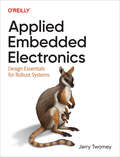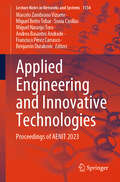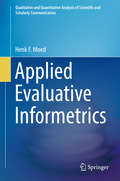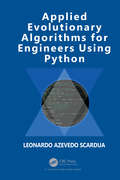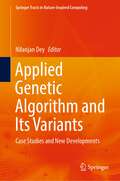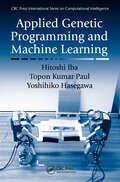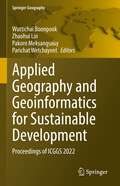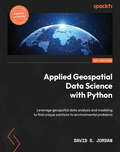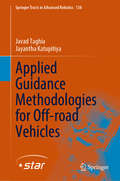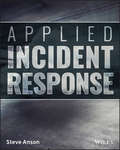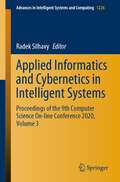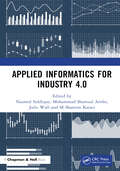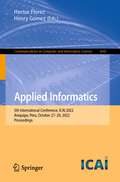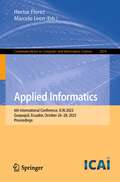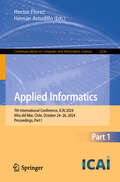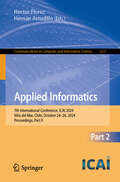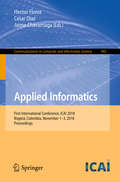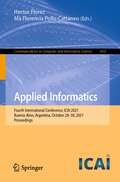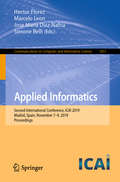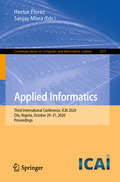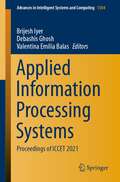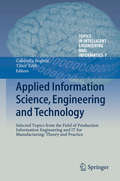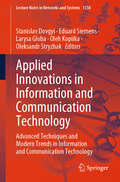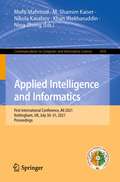- Table View
- List View
Applied Embedded Electronics: Design Essentials for Robust Systems
by Jerry TwomeyEmbedded controller electronics are at the heart of virtually all modern electronic devices today with a market of more than $86 billion per year and growing. To serve the needs of designers creating products for this huge market, this practical book covers topics crucial for modern electronics design.Author Jerry Twomey examines the methods necessary to help you create a trouble-free integrated system for your product, with an emphasis on hardware design. You'll explore topics from the perspective of real-world applications, including discussions about non-ideal components, noise, and methods for avoiding problematic scenarios.Topics include:Ideal versus actual connections, components, digital, signalsArchitecting an embedded systemDigital interface selection by application, speed, distanceMultivoltage power suppliesHigh frequency power integrityBattery and charging systemsEMI reduction and ESD protectionDriving and sensing peripheralsDigital feedback controlOptimization of power consumption and costSpecialty systems: medical, industrial, aerospacePCB design including manufacturability, yield, and low noiseThis book guides you through all of the techniques listed, which are required for a reliable integrated system. Through extensive illustrations and minimal equations, anyone with an interest in electronics will quickly grasp the ideas discussed.
Applied Engineering and Innovative Technologies: Proceedings of AENIT 2023 (Lecture Notes in Networks and Systems #1134)
by Marcelo Zambrano Vizuete Benjamin Durakovic Miguel Botto Tobar Sonia Casillas Miguel Naranjo Toro Andrea Basantes Andrade Francisco Pérez CarrascoOn November 22, 23, and 24, 2023, the International Conference of Applied Engineering and Innovative Technologies (AENIT-2023) was held at the “El Olivo” Campus of the Universidad Técnica del Norte—UTN (Ibarra-Ecuador). The main objective of the conference was to allow the exchange of knowledge and experiences between researchers from the different national and international universities that attended it. The event was organized by the UTN and had the academic endorsement of Cisco Latam Network Academy, Institute of Electrical and Electronic Engineers (IEEE), EC-Council Academia LATAM, Amazon Web Services (AWS), CEDIA (Ecuador), Universidad Mariana (Colombia), Universidad Cooperativa de Colombia (Colombia), Universidad Nacional de la Plata (Argentina) and la Universidad Técnica de Manabí (Ecuador). The publications presented at the conference were evaluated by a high-level International Scientific Committee, which evaluated the relevance and originality of the works under a double-blind peer modality. 114 articles were received, of which 48 were accepted for publication. Due to the uncertainty caused by the COVID-19 pandemic, the conference was held in a hybrid format (in-person and virtual).
Applied Evaluative Informetrics (Qualitative and Quantitative Analysis of Scientific and Scholarly Communication)
by Henk F. MoedThis book focuses on applied evaluative informetric artifacts or topics. It explains the base notions and assumptions of evaluative informetrics by discussing a series of important applications. The structure of the book is therefore not organized by methodological characteristics, but is centered around popular, often discussed or used informetric artifacts - indicators, methodologies, products, databases - or so called hot topics in which informetric indicators play an important role. Most of the artifacts and topics emerged during the past decade. The principal aims of the book is to present a state of the art in applied evaluative informetrics, and to inform the readers about the pros and cons, potentialities and limitations of the use of informetric/bibliometric indicators in research assessment. The book is a continuation of the book Citation Analysis in Research Evaluation (Springer, 2005). It is of interest to non-specialists, especially research students at advanced master level and higher, all those subjected to quantitative research assessment, research managers and other users of applied informetric techniques, and interested scholars from all domains of science and scholarship.
Applied Evolutionary Algorithms for Engineers using Python
by Leonardo Azevedo ScarduaApplied Evolutionary Algorithms for Engineers with Python is written for students, scientists and engineers who need to apply evolutionary algorithms to practical optimization problems. The presentation of the theoretical background is complemented with didactical Python implementations of evolutionary algorithms that researchers have recently applied to complex optimization problems. Cases of successful application of evolutionary algorithms to real-world like optimization problems are presented, together with source code that allows the reader to gain insight into the idiosyncrasies of the practical application of evolutionary algorithms. Key Features Includes detailed descriptions of evolutionary algorithm paradigms Provides didactic implementations of the algorithms in Python, a programming language that has been widely adopted by the AI community Discusses the application of evolutionary algorithms to real-world optimization problems Presents successful cases of the application of evolutionary algorithms to complex optimization problems, with auxiliary source code.
Applied Generative AI for Beginners: Practical Knowledge on Diffusion Models, ChatGPT, and Other LLMs
by Akshay Kulkarni Adarsha Shivananda Anoosh Kulkarni Dilip GudivadaThis book provides a deep dive into the world of generative AI, covering everything from the basics of neural networks to the intricacies of large language models like ChatGPT and Google Bard. It serves as a one-stop resource for anyone interested in understanding and applying this transformative technology and is particularly aimed at those just getting started with generative AI. Applied Generative AI for Beginners is structured around detailed chapters that will guide you from foundational knowledge to practical implementation. It starts with an introduction to generative AI and its current landscape, followed by an exploration of how the evolution of neural networks led to the development of large language models. The book then delves into specific architectures like ChatGPT and Google Bard, offering hands-on demonstrations for implementation using tools like Sklearn. You’ll also gain insight into the strategic aspects of implementing generative AI in an enterprise setting, with the authors covering crucial topics such as LLMOps, technology stack selection, and in-context learning. The latter part of the book explores generative AI for images and provides industry-specific use cases, making it a comprehensive guide for practical application in various domains. Whether you're a data scientist looking to implement advanced models, a business leader aiming to leverage AI for enterprise growth, or an academic interested in cutting-edge advancements, this book offers a concise yet thorough guide to mastering generative AI, balancing theoretical knowledge with practical insights. What You Will Learn Gain a solid understanding of generative AI, starting from the basics of neural networks and progressing to complex architectures like ChatGPT and Google BardImplement large language models using Sklearn, complete with code examples and best practices for real-world applicationLearn how to integrate LLM’s in enterprises, including aspects like LLMOps and technology stack selectionUnderstand how generative AI can be applied across various industries, from healthcare and marketing to legal compliance through detailed use cases and actionable insights Who This Book Is For Data scientists, AI practitioners, Researchers and software engineers interested in generative AI and LLMs.
Applied Genetic Algorithm and Its Variants: Case Studies and New Developments (Springer Tracts in Nature-Inspired Computing)
by Nilanjan DeyThis book provides fundamental concepts related to various types of genetic algorithms and practical applications in various domains such as medical imaging, manufacturing, and engineering design. The book discusses genetic algorithms which are used to solve a variety of optimization problems. The genetic algorithms are demonstrated to offer reliable search in complex spaces. The book presents high-quality research work by academics and researchers which is useful for young researchers and students.
Applied Genetic Programming and Machine Learning
by Hitoshi Iba Yoshihiko Hasegawa Topon Kumar PaulWhat do financial data prediction, day-trading rule development, and bio-marker selection have in common? They are just a few of the tasks that could potentially be resolved with genetic programming and machine learning techniques. Written by leaders in this field, Applied Genetic Programming and Machine Learning delineates the extension of Genetic
Applied Geography and Geoinformatics for Sustainable Development: Proceedings of ICGGS 2022 (Springer Geography)
by Zhaohui Lin Parichat Wetchayont Wuttichai Boonpook Pakorn MeksangsouyThis volume presents the proceedings of the 2nd International Conference of Geography and Geoinformatics for Sustainable Development (ICGGS), held in Phuket, Thailand, April 7-8, 2022. The collection focuses on the importance of spatial thinking and planning by applying geography concepts and geospatial technology innovations in solving global problems such as environmental degradation, urban pollution, and climate change. The proceedings consist of case studies on wide-ranging spatial issues in developing countries, addressing challenges in mainstreaming sustainable development paradigms into their economies to improve natural resource and environmental management. One of the main goals of the volume is to share and exchange different points of view regarding global, regional, and local spatial issues and how to use geography and geoinformatics for building resilience in multiple sectors, e.g., water, ecosystems, agriculture, and health. It offers the opportunity to learn about how geospatial concepts and technologies can contribute to environmental sustainability, while advancing education and research related to geography and geoinformatics. It will be a useful resource for students and researchers to initiate research ideas related to geospatial topics in regional and local scales.
Applied Geospatial Data Science with Python: Leverage geospatial data analysis and modeling to find unique solutions to environmental problems
by David S. JordanIntelligently connect data points and gain a deeper understanding of environmental problems through hands-on Geospatial Data Science case studies written in PythonThe book includes colored images of important conceptsKey FeaturesLearn how to integrate spatial data and spatial thinking into traditional data science workflowsDevelop a spatial perspective and learn to avoid common pitfalls along the wayGain expertise through practical case studies applicable in a variety of industries with code samples that can be reproduced and expandedBook DescriptionData scientists, when presented with a myriad of data, can often lose sight of how to present geospatial analyses in a meaningful way so that it makes sense to everyone. Using Python to visualize data helps stakeholders in less technical roles to understand the problem and seek solutions. The goal of this book is to help data scientists and GIS professionals learn and implement geospatial data science workflows using Python.Throughout this book, you'll uncover numerous geospatial Python libraries with which you can develop end-to-end spatial data science workflows. You'll learn how to read, process, and manipulate spatial data effectively. With data in hand, you'll move on to crafting spatial data visualizations to better understand and tell the story of your data through static and dynamic mapping applications. As you progress through the book, you'll find yourself developing geospatial AI and ML models focused on clustering, regression, and optimization. The use cases can be leveraged as building blocks for more advanced work in a variety of industries.By the end of the book, you'll be able to tackle random data, find meaningful correlations, and make geospatial data models.What you will learnUnderstand the fundamentals needed to work with geospatial dataTransition from tabular to geo-enabled data in your workflowsDevelop an introductory portfolio of spatial data science work using PythonGain hands-on skills with case studies relevant to different industriesDiscover best practices focusing on geospatial data to bring a positive change in your environmentExplore solving use cases, such as traveling salesperson and vehicle routing problemsWho this book is forThis book is for you if you are a data scientist seeking to incorporate geospatial thinking into your workflows or a GIS professional seeking to incorporate data science methods into yours. You'll need to have a foundational knowledge of Python for data analysis and/or data science.
Applied Guidance Methodologies for Off-road Vehicles (Springer Tracts in Advanced Robotics #138)
by Javad Taghia Jayantha KatupitiyaThis book provides methodologies for designing and implementing guidance algorithms for autonomous vehicles. These algorithms make important decision regarding how to steer and drive a ground vehicle in order to safely stay on an intended path, thereby making the vehicle driverless. The design tools provided in this book enable the reader to develop highly practical and real-world implementable guidance algorithms that will deliver high-accuracy driving for field vehicles. (They are equally applicable for on-road vehicles.) The book covers a variety of vehicle types, including wheeled vehicles, tracked vehicles, wheeled and tracked vehicles towing trailers, and four-wheel-steer and four-wheel-drive vehicles. It also covers active trailers that are driven and steered. Vehicles used in agriculture, mining and road construction are subjected to unpredictable and significant disturbances. The robust control methodologies presented can successfully compensate for these disturbances, as confirmed by the experimental results presented. Though the majority of the methodologies presented are based on sliding-mode controllers, other robust control methodologies are also discussed. To help the reader decide which controller is best suited for his/her choice of vehicle, experimental results are presented in a comparative format.
Applied Incident Response
by Steve AnsonIncident response is critical for the active defense of any network, and incident responders need up-to-date, immediately applicable techniques with which to engage the adversary. Applied Incident Response details effective ways to respond to advanced attacks against local and remote network resources, providing proven response techniques and a framework through which to apply them. As a starting point for new incident handlers, or as a technical reference for hardened IR veterans, this book details the latest techniques for responding to threats against your network, including: Preparing your environment for effective incident response Leveraging MITRE ATT&CK and threat intelligence for active network defense Local and remote triage of systems using PowerShell, WMIC, and open-source tools Acquiring RAM and disk images locally and remotely Analyzing RAM with Volatility and Rekall Deep-dive forensic analysis of system drives using open-source or commercial tools Leveraging Security Onion and Elastic Stack for network security monitoring Techniques for log analysis and aggregating high-value logs Static and dynamic analysis of malware with YARA rules, FLARE VM, and Cuckoo Sandbox Detecting and responding to lateral movement techniques, including pass-the-hash, pass-the-ticket, Kerberoasting, malicious use of PowerShell, and many more Effective threat hunting techniques Adversary emulation with Atomic Red Team Improving preventive and detective controls
Applied Informatics and Cybernetics in Intelligent Systems: Proceedings of the 9th Computer Science On-line Conference 2020, Volume 3 (Advances in Intelligent Systems and Computing #1226)
by Radek SilhavyThis book gathers the refereed proceedings of the Applied Informatics and Cybernetics in Intelligent Systems Section of the 9th Computer Science On-line Conference 2020 (CSOC 2020), held on-line in April 2020. Modern cybernetics and computer engineering in connection with intelligent systems are an essential aspect of ongoing research. This book addresses these topics, together with automation and control theory, cybernetic applications, and the latest research trends.
Applied Informatics for Industry 4.0
by Nazmul Siddique M Shamim Kaiser Mohammad Shamsul Arefin Julie WallApplied Informatics for Industry 4.0 combines the technologies of computer science and information science to assist in the management and processing of data to provide different types of services. Due to the adaptation of 4.0 IR-related technologies, applied informatics is playing a vital role in different sectors such as healthcare, complex system design and privacy-related issues. This book focuses on cutting edge research from the fields of informatics and complex industrial systems, and will cover topics including health informatics, bioinformatics, brain informatics, genomics and proteomics, data and network security and more. The text will appeal to beginners and advanced researchers in the fields of computer science, information sciences, electrical and electronic engineering and robotics.
Applied Informatics: 5th International Conference, ICAI 2022, Arequipa, Peru, October 27–29, 2022, Proceedings (Communications in Computer and Information Science #1643)
by Hector Florez Henry GomezThis book constitutes the proceedings of the 5th International Conference on Applied Informatics, ICAI 2022, which took place in Arequipa, Peru, in October 2022. The 32 papers presented in this volume were carefully reviewed and selected from 90 submissions. The contributions are divided into the following thematic blocks: Artificial Intelligence; Data Analysis; Decision Systems; Health Care Information Systems; ICT-Enabled Social Innovation; Image Processing; Robotic Autonomy; Software Architectures; Software Design Engineering.
Applied Informatics: 6th International Conference, ICAI 2023, Guayaquil, Ecuador, October 26–28, 2023, Proceedings (Communications in Computer and Information Science #1874)
by Hector Florez Marcelo LeonThis book constitutes the proceedings of the 6th International Conference on Applied Informatics, ICAI 2023, which took place in Guayaquil, Ecuador, in October 2023.The 30 papers presented in this volume were carefully reviewed and selected from 132 submissions. The contributions are divided into the following thematic blocks: Artificial Intelligence; Data Analysis; Decision Systems; Enterprise Information Systems Applications; Geoinformatics; Health Care Information Systems; Interdisciplinary Information Studies; Learning Management Systems; Virtual and Augmented Reality.
Applied Informatics: 7th International Conference, ICAI 2024, Viña del Mar, Chile, October 24–26, 2024, Proceedings, Part I (Communications in Computer and Information Science #2236)
by Hector Florez Hernán AstudilloThe two-volume set CCIS 2236 and 2237 constitutes the refereed proceedings of the 7th International Conference on Applied Informatics, ICAI 2024, held in Vina del Mar, Chile, during October 24–26, 2024. The 39 full papers presented in these proceedings were carefully reviewed and selected from 123 submissions. The papers were organized in the following topical sections: Part I - Artificial Intelligence; Bioinformatics; Cloud Computing; Data Analysis; Decision Systems; and Game Development. Part II - Health Care Information Systems; Interdisciplinary Information Studies; Learning Management Systems; Natural Language Processing; Social and Behavioral Applications; Software and Systems Modeling; and Software Architectures.
Applied Informatics: 7th International Conference, ICAI 2024, Viña del Mar, Chile, October 24–26, 2024, Proceedings, Part II (Communications in Computer and Information Science #2237)
by Hector Florez Hernán AstudilloThe two-volume set CCIS 2236 and 2237 constitutes the refereed proceedings of the 7th International Conference on Applied Informatics, ICAI 2024, held in Vina del Mar, Chile, during October 24–26, 2024. The 39 full papers presented in these proceedings were carefully reviewed and selected from 123 submissions. The papers were organized in the following topical sections: Part I - Artificial Intelligence; Bioinformatics; Cloud Computing; Data Analysis; Decision Systems; and Game Development. Part II - Health Care Information Systems; Interdisciplinary Information Studies; Learning Management Systems; Natural Language Processing; Social and Behavioral Applications; Software and Systems Modeling; and Software Architectures.
Applied Informatics: First International Conference, ICAI 2018, Bogotá, Colombia, November 1-3, 2018, Proceedings (Communications in Computer and Information Science #942)
by Hector Florez Cesar Diaz Jaime ChavarriagaThis book constitutes the thoroughly refereed papers of the First International Conference on Applied Informatics, ICAI 2018, held in Bogotá, Colombia, in November 2018. The 27 full papers were carefully reviewed and selected from 81 submissions. The papers are organized in topical sections on data analysis; decision systems; health care information systems; IT architectures; learning management systems; mobile information processing systems; robotic autonomy; software design engineering.
Applied Informatics: Fourth International Conference, ICAI 2021, Buenos Aires, Argentina, October 28–30, 2021, Proceedings (Communications in Computer and Information Science #1455)
by Hector Florez Ma Florencia Pollo-CattaneoThis book constitutes the thoroughly refereed papers of the 4th International Conference on Applied Informatics, ICAI 2021, held in Buenos Aires, Argentina, in October, 2021.The 35 full papers were carefully reviewed and selected from 89 submissions. The papers are organized in topical sections on artificial intelligence; data analysis; decision systems; health care information systems; image processing; security services; simulation and emulation; smart cities; software and systems modeling; software design engineering.
Applied Informatics: Second International Conference, ICAI 2019, Madrid, Spain, November 7–9, 2019, Proceedings (Communications in Computer and Information Science #1051)
by Hector Florez Marcelo Leon Jose Maria Diaz-Nafria Simone BelliThis book constitutes the thoroughly refereed papers of the Second International Conference on Applied Informatics, ICAI 2019, held in Madrid, Spain, in November 2019.The 37 full papers and one short paper were carefully reviewed and selected from 98 submissions. The papers are organized in topical sections on bioinformatics; data analysis; decision systems; health care information systems; IT Architectures; learning management systems; robotic autonomy; security services; socio-technical systems; software design engineering.
Applied Informatics: Third International Conference, ICAI 2020, Ota, Nigeria, October 29–31, 2020, Proceedings (Communications in Computer and Information Science #1277)
by Sanjay Misra Hector FlorezThis book constitutes the thoroughly refereed papers of the Second International Conference on Applied Informatics, ICAI 2020, held in Ota, Nigeria, in October 2020. The 35 full papers were carefully reviewed and selected from 101 submissions. The papers are organized in topical sections on artificial intelligence; business process management; cloud computing; data analysis; decision systems; health care information systems; human-computer interaction; image processing; learning management systems; software design engineering.
Applied Information Processing Systems: Proceedings of ICCET 2021 (Advances in Intelligent Systems and Computing #1354)
by Debashis Ghosh Valentina Emilia Balas Brijesh IyerThis book is a collection of selected high-quality research papers presented at the International Conference on Computing in Engineering and Technology (ICCET 2021), organized by Dr. Babasaheb Ambedkar Technological University, Lonere, India, during January 30–31, 2021. Focusing on frontier topics and next-generation technologies, it presents original and innovative research from academics, scientists, students and engineers alike. The theme of the conference is Applied Information Processing System.
Applied Information Science, Engineering and Technology: Selected Topics from the Field of Production Information Engineering and IT for Manufacturing: Theory and Practice (Topics in Intelligent Engineering and Informatics #7)
by Gabriella Bognár Tibor TóthThe objective of the book is to give a selection from the papers, which summarize several important results obtained within the framework of the József Hatvany Doctoral School operating at the University of Miskolc, Hungary. In accordance with the three main research areas of the Doctoral School established for Information Science, Engineering and Technology, the papers can be classified into three groups. They are as follows: (1) Applied Computational Science; (2) Production Information Engineering (IT for Manufacturing included); (3) Material Stream Systems and IT for Logistics. As regards the first area, some papers deal with special issues of algorithms theory and its applications, with computing algorithms for engineering tasks, as well as certain issues of data base systems and knowledge intensive systems. Related to the second research area, the focus is on Production Information Engineering with special regard to discrete production processes. In the second research area the papers show some new integrated systems suitable for optimizing discrete production processes in a top-down way. The papers connecting with the third research field deal with different issues of materials stream systems and logistics, taking into consideration of applied mathematical models and IT-tools. The book makes an effort to ensure certain equilibrium between theory and practice and to show some new approach both from theoretical modelling aspect, as well as experimental and practical point of view.
Applied Innovations in Information and Communication Technology: Advanced Techniques and Modern Trends in Information and Communication Technology (Lecture Notes in Networks and Systems #1338)
by Larysa Globa Stanislav Dovgyi Eduard Siemens Oleh Kopiika Oleksandr StryzhakThis book highlights the most important research areas in Information and Communication Technologies and their impact on digital society and environment sustainable development namely the research in fields of information and communication technologies, artificial intelligence in ICT, data analytics, security of data and services, reducing energy consumption in the digital environment, and mathematical modeling for practical and research tasks in communication and data processing fields provided by various groups of researchers from Germany and Ukraine in cooperation with scientists from different countries. The presented studies contain a discussion on the use of artificial intelligence, in particular, methods of deep learning, practical implementation of the Internet of Things (IoT), the modern study of ECO monitoring systems; research in fields of mathematical modeling in applied problems. The book focuses on the basics of information and analytical activities in the digital global space, to providing broadband Internet access without decreasing the quality of experience (QoE) level, improving services providing, and system architecture for SDN. The study of modern communication and information technologies contains original works dealing with many aspects of their improvement and use for forecasting social and environment sustainable development based on global information space, as well as research that contains actual papers, which show some effective technological solutions that can be used for the implementation of novel cloud infrastructure and radio electronics systems. These results can be used in the implementation of novel systems and to promote the exchange of information in e-societies. Given its scope the book offers a valuable resource for scientists, lecturers, specialists working at enterprises, graduate and undergraduate students who engage with problems in Information and Communication Technologies as well as aspects of society and environment sustainable development.
Applied Intelligence and Informatics: First International Conference, AII 2021, Nottingham, UK, July 30–31, 2021, Proceedings (Communications in Computer and Information Science #1435)
by Nikola Kasabov Ning Zhong Mufti Mahmud M. Shamim Kaiser Khan IftekharuddinThis book constitutes the refereed proceedings of the First International Conference on Applied Intelligence and Informatics, AII 2021, held in Nottingham, UK, in July 2021. Due to the COVID-19 pandemic the conference was held in a fully virtual mode. The 26 full papers and 4 short papers presented were thoroughly reviewed and selected from the total 107 submissions. They are organized in the following topical sections: application of AI and informatics in disease detection; application of AI and informatics in healthcare; application of AI and informatics in pattern recognition; application of AI and informatics in network, security, and analytics; emerging applications of AI and informatics.
